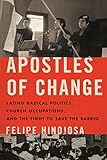Apostles of Change : Latino Radical Politics, Church Occupations, and the Fight to Save the Barrio / Felipe Hinojosa.
Material type: TextSeries: Historia USAPublisher: Austin : University of Texas Press, [2021]Copyright date: ©2021Description: 1 online resource (237 p.) : 27 b&w photos, 2 b&w illus., 4 b&w mapsContent type:
TextSeries: Historia USAPublisher: Austin : University of Texas Press, [2021]Copyright date: ©2021Description: 1 online resource (237 p.) : 27 b&w photos, 2 b&w illus., 4 b&w mapsContent type: - 9781477321980
- 9781477322000
- Christianity and politics -- United States -- History -- 20th century
- Church and social problems -- United States -- History -- 20th century
- Church buildings -- Secular use -- United States -- History -- 20th century
- Hispanic Americans -- Political activity -- United States -- History -- 20th century
- Protest camps -- United States -- History -- 20th century
- Radicalism -- United States -- Religious aspects -- Christianity -- History -- 20th century
- Urban renewal -- Social aspects -- United States -- History -- 20th century
- HISTORY / General
- barrio, Mexican American history, Mexican American, Latino, activism, civil rights, radical politics, religion, Latino faith, Mexican American Youth Organization, Young Lords, immigrant rights, advocacy, community organizing, Houston, Politics, Latina, Latinx, Chicano, Chicana, Chicanx, Church, Texas, History, US History, American History, American Studies
- 303.484 23
- HN49.R33 H55 2021
- online - DeGruyter
| Item type | Current library | Call number | URL | Status | Notes | Barcode | |
|---|---|---|---|---|---|---|---|
 eBook
eBook
|
Biblioteca "Angelicum" Pont. Univ. S.Tommaso d'Aquino Nuvola online | online - DeGruyter (Browse shelf(Opens below)) | Online access | Not for loan (Accesso limitato) | Accesso per gli utenti autorizzati / Access for authorized users | (dgr)9781477322000 |
Browsing Biblioteca "Angelicum" Pont. Univ. S.Tommaso d'Aquino shelves, Shelving location: Nuvola online Close shelf browser (Hides shelf browser)

|

|

|

|

|

|

|
||
| online - DeGruyter All I Ever Wanted : A Rock 'n' Roll Memoir / | online - DeGruyter A Singing Army : Zilphia Horton and the Highlander Folk School / | online - DeGruyter A Single Star and Bloody Knuckles : A History of Politics and Race in Texas / | online - DeGruyter Apostles of Change : Latino Radical Politics, Church Occupations, and the Fight to Save the Barrio / | online - DeGruyter Reverberations of Racial Violence : Critical Reflections on the History of the Border / | online - DeGruyter American Twilight : The Cinema of Tobe Hooper / | online - DeGruyter Building Antebellum New Orleans : Free People of Color and Their Influence / |
Frontmatter -- Contents -- Preface -- Acknowledgments -- Abbreviations -- Introduction The People’s Church -- Chapter One Thunder in Chicago’s Lincoln Park -- Chapter Two “People—Yes, Cathedrals—No!” in Los Angeles -- Chapter Three The People’s Church in East Harlem -- Chapter Four Magic in Houston’s Northside Barrio -- Conclusion When History Dreams -- Notes -- Bibliography -- Index
restricted access online access with authorization star
http://purl.org/coar/access_right/c_16ec
In the late 1960s, the American city found itself in steep decline. An urban crisis fueled by federal policy wreaked destruction and displacement on poor and working-class families. The urban drama included religious institutions, themselves undergoing fundamental change, that debated whether to stay in the city or move to the suburbs. Against the backdrop of the Black and Brown Power movements, which challenged economic inequality and white supremacy, young Latino radicals began occupying churches and disrupting services to compel church communities to join their protests against urban renewal, poverty, police brutality, and racism. Apostles of Change tells the story of these occupations and establishes their context within the urban crisis; relates the tensions they created; and articulates the activists' bold, new vision for the church and the world. Through case studies from Chicago, Los Angeles, New York City, and Houston, Felipe Hinojosa reveals how Latino freedom movements frequently crossed boundaries between faith and politics and argues that understanding the history of these radical politics is essential to understanding the dynamic changes in Latino religious groups from the late 1960s to the early 1980s.
Mode of access: Internet via World Wide Web.
In English.
Description based on online resource; title from PDF title page (publisher's Web site, viewed 29. Mai 2023)


